Meet some of the women who are fighting against climate change
Women are often a minority in science, but they are working to change that.
Women all over the world are playing integral roles in the fight against warming temperatures.
For Earth Day 2021, ABC News is highlight three scientists and one activist who are leading the charge against climate change.
Here are their stories:
The Arctic explorer
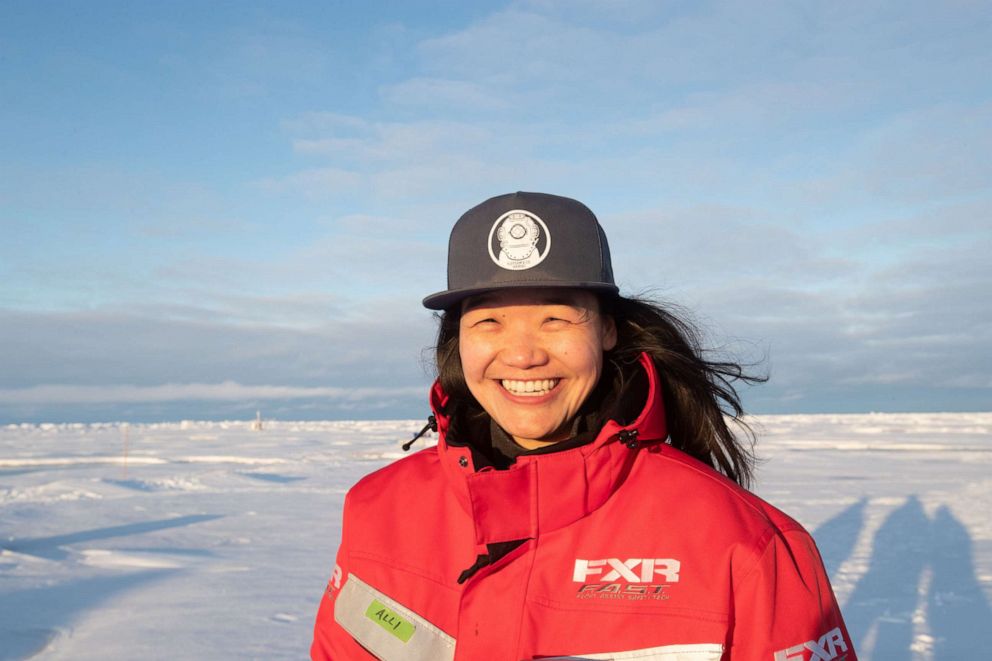
Allison Fong, 39, is a trained biological oceanographer and sea ice ecologist for the Alfred Wegener Institute Helmholtz Center for Polar and Marine Research in Bremerhaven, Germany, has spent more than 300 days in the Arctic since 2015.
Fong studies the bacteria small phytoplankton that are important for controlling carbon and the cycle of exchange of carbon between the ocean, ice and the atmosphere, she told ABC News.
For the past few years, Fong has taken part in an expedition called Mosaic, in which researchers took the German icebreaker RV Polarstern and froze it into the Arctic sea ice. The scientists then let it drift across the central Arctic Ocean for one year in an effort to understand how the climate in the Arctic is changing.
"It's changing faster than any other place on Earth," Fong said. "We're losing sea ice at an exponential rate compared to years before, and that has an impact -- not just on what's happening in polar regions. but also what's happening in temperate, mid-latitude areas."
The ice in the Arctic is becoming thinner, and the proportion of very thick ice to thin ice is lessening as well, Fong said. The thin ice is more susceptible to breaking, and when it breaks, there is less white surface area to reflect the radiative heat from the sun, and more dark, blue water to absorb the heat, which warms the ocean surface even more, Fong said. This means longer periods of less ice and a later start of new ice formation.
Fong believes the work she is doing is critical because her research is helping to build knowledge to address the climate crisis, especially with how what are considered to be natural cycles are now perturbed by human activity.
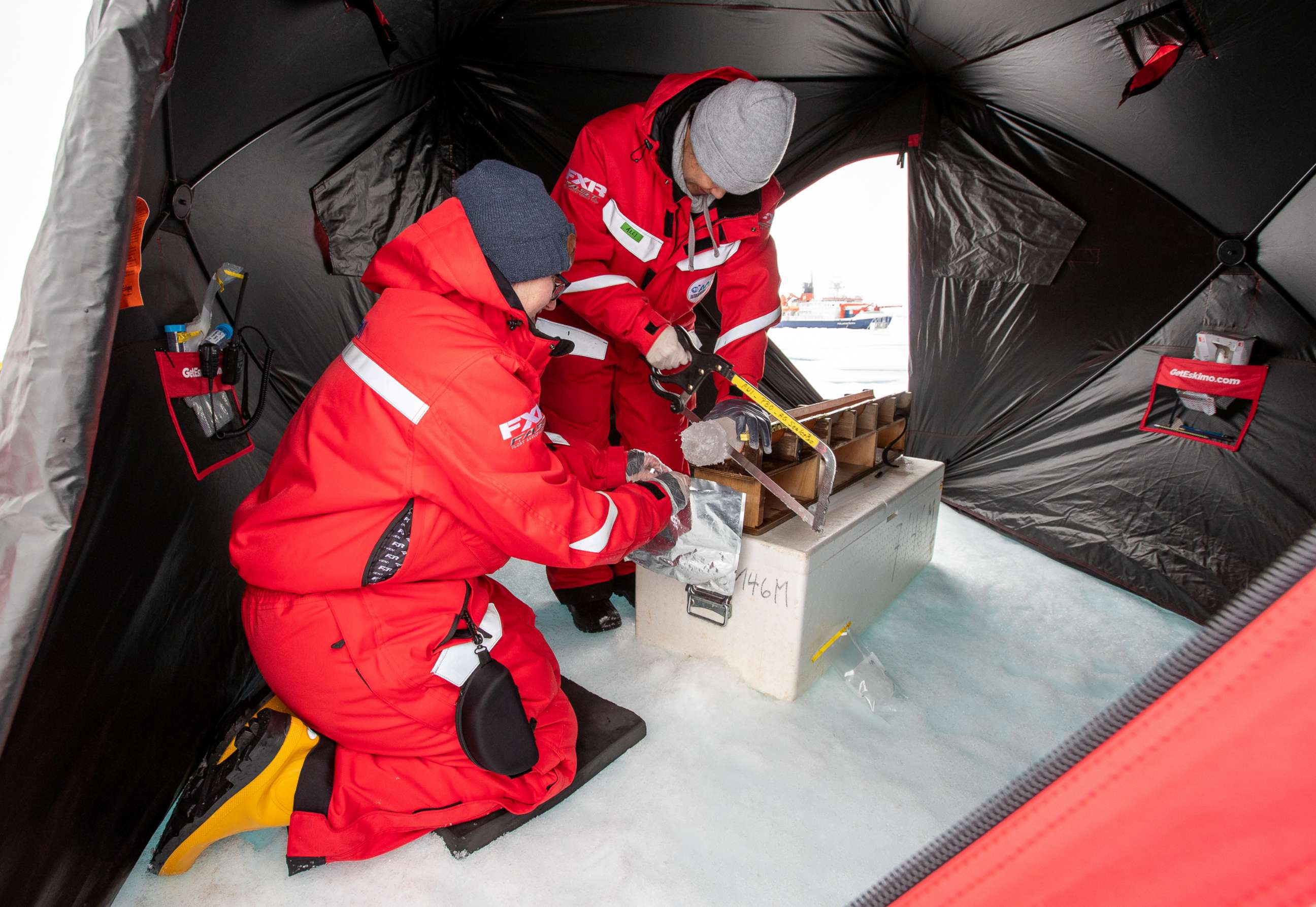
"So, if you're going to try to act to change things for the better, if you're going to try to modify how we behave within the ecosystem as a species on Earth, then we need to know what's happening to the environment," Fong said.
Her love for the ocean originated after growing up in close proximity to the beach on Rhode Island.
"It became clear that my love for science could be coupled with my love for being by the ocean, in the ocean, learning about the ocean," she said.
While ocean sciences have traditionally been a male-dominated field, Fong said she is encouraged by the fact that women are becoming a more important entity to the enterprise of science. She believes that excluding women from the conversation is ignoring the "volume of brain power" by 50%.
"When you're trying to be successful, you would never have your chances of that success by cutting people by cutting half of the half of your chances out," she said.
Fong also believes that an important part of his role is to engage people to be curious about the planet, which in turn will empower them to act. So, she makes a point to reach out to high school students or whoever is willing to listen and talk about why it is so important to highlight regions that seem so disconnected from their daily lives.
The NASA program director
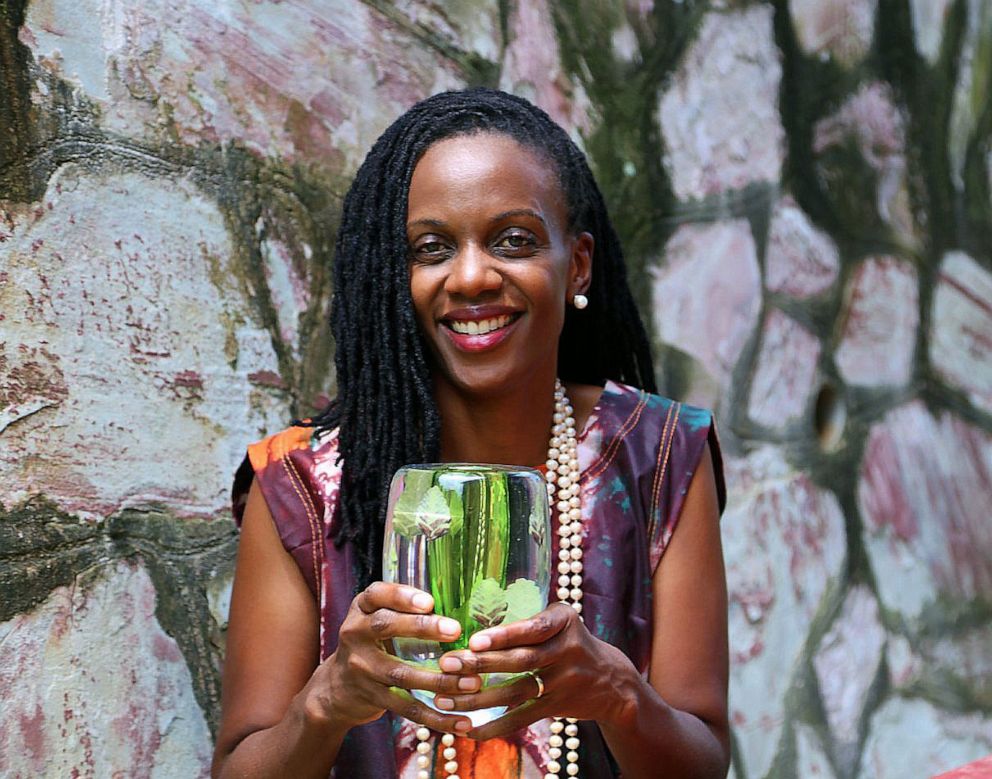
Catherine Lilian Nakalembe, Ph.D., 37, studies the world's food supply as director of NASA's Harvest Africa Program and is already seeing the effects of climate change on communities in Africa, she told ABC News.
Nakalembe uses satellite imagery to monitor agriculture and gather data to advance methods and influence policy decisions. But her work goes beyond studying images from afar.
Through her work in the field, Nakalembe has seen how climate change has affected people. She would participate in mapping the land to collect ground data for satellite archiving systems and see villages with fields that should be thriving mid-season be washed away by a flood.
She would see families affected by a dry season collect large rocks to sell for a small amount of money to be able to buy a meal for the next day. She would see women, including pregnant women, walking farther and farther with arms full of firewood and large canisters for water balancing on their heads. The drier it gets, the further the women have to walk, Nakalembe said.
Witnessing the devastation first-hand made Nakalembe appreciate the meaning behind her research, transforming the raw data into something visible and tangible.
"It gives meaning behind the things that you're looking into," she said.
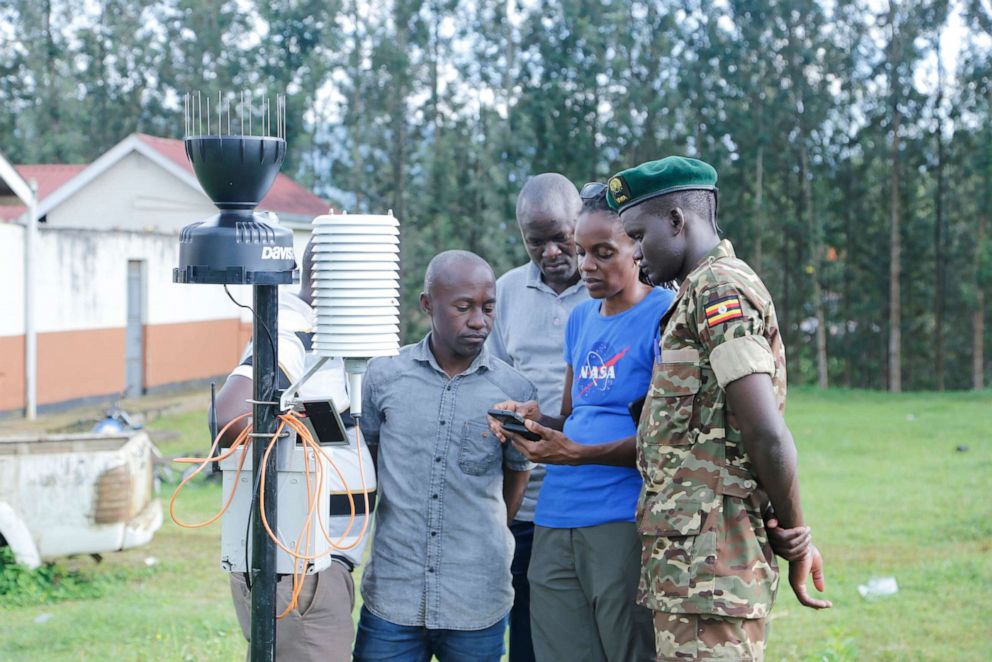
Nakalembe had never left her home in Kampala, Uganda, before enrolling into the environment engineering masters program at Johns Hopkins University in Baltimore, where she took classes on climate change and climate policy, she said. She later got her doctorate in geographical sciences at the University of Maryland. It was there that she discovered her love of fieldwork, especially since she was able to travel back to Uganda to study food security and drought using satellite remote sensing.
There's a "stark" difference in accessibility to data and technology between the U.S. and developing countries like Uganda, Tanzania and Kenya, where food security as a result of a warming climate is already apparent, Nakalembe said. In a developed country, the delay to the start of a season can be forecast, whereas in a place like Kenya, the information is not getting into the right hands, she said.
"It's not in the future," Nakalembe said of climate change. "It's here with us now."
Women have historically been a minority in Nakalembe's field, especially in leadership positions, but that is changing more and more with time, which instrumental in creating diversity in science, she said.
"This is really fantastic," she said. "It helps you aspire to want to do the same. It helps you dream."
The ground observer
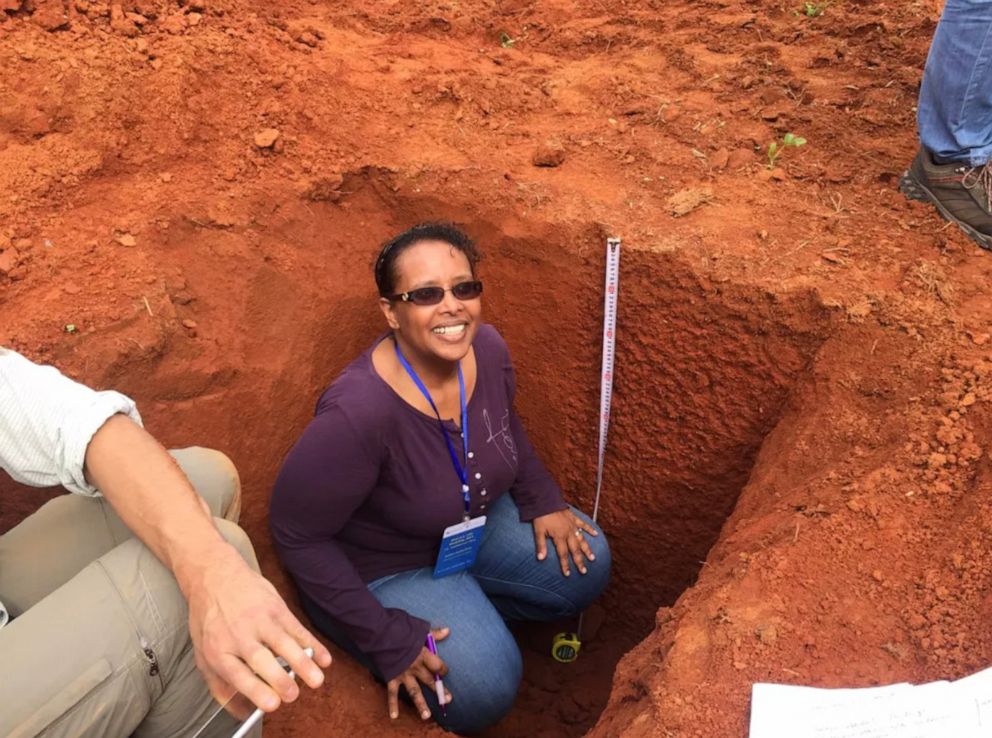
Many natural components in the Earth's environment help to maintain its climate, like the way the ice reflects sunlight and how trees store carbon.
Asmeret Asefaw Berhe, 46, professor of soil biogeochemistry at the University of California Merced, studies how the soil system maintains temperatures, particularly the organic compounds in soil, which are basically residue of formerly living organisms at different stages of decay, Berhe told ABC News.
In her lab, Berhe tries to understand the mechanisms of how soil can slow down the rates of decay of microbes -- which are the primary source of greenhouse gases from soil to the atmosphere -- and how to ensure that fewer greenhouse gases are released.
Berhe began her career by studying soil science as an undergraduate student.
"There, the inspiration was, you know, trying to learn more about this dynamic world under our foot that we usually take for granted but provides so many of the key critical ecosystem processes that actually sustains life on the earth system," she said.
Berhe kept discovering new and fascinating things about soil, and by the time she got to graduate school, "climate change was everywhere," she said.
"It was starting to be very evident that the soil system can either be part of the solution or the problem with respect to climate change, depending on how human beings treat the soil of how we use overuse and sometimes abuse the soil system," Berhe said.
While there is universal concern in the science community about the fast pace of how the climate is changing, Berhe believes there's also reason to be hopeful.
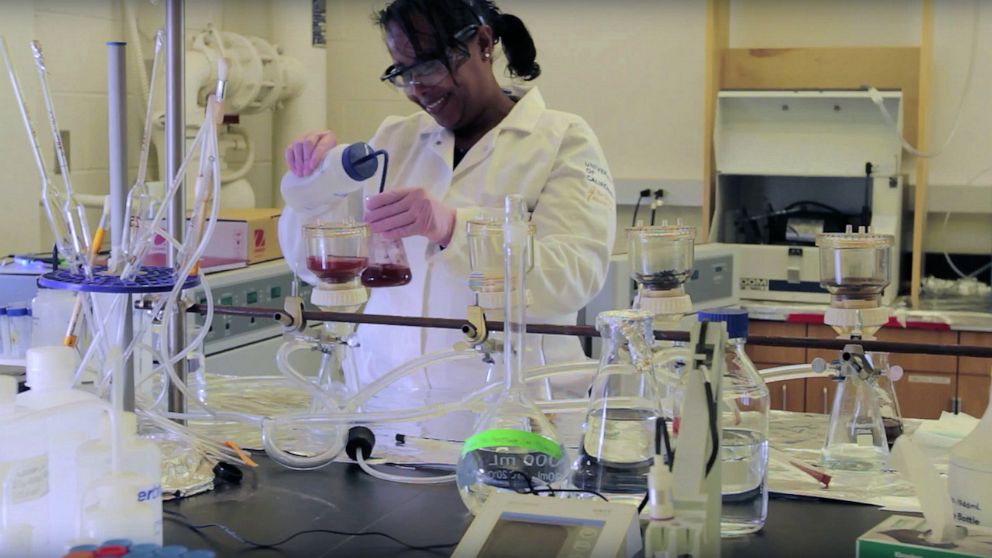
"The global community is at a point where we are accelerating the pace at which we are trying to pursue opportunities to address climate change," terms of adopting renewable energy, easing the release of greenhouse gases and addressing ecosystem degradation," Berhe said.
Berhe believes it is "extremely important" to have women's voices in the community that is addressing climate change, because existing power systems all over the world have made women and communities that depend more on women more vulnerable to the changing climate, she said.
"Women are more dependent on the natural environment for their subsistence in many parts of the world, and they're also affected by poverty a lot," Berhe said.
While there's a growing number of women involved in the climate space, there is still a considerable lag when it comes to women of color and people of color in general, Berhe said. Empowering and educating these groups will be crucial to achieving a more representative community.
"So, I think it's extremely important that we have the voices of the people that are experiencing the worst impacts of climate change at every step of the conversation, including when we're selecting what topics to prioritize, when we're making decisions about how to communicate the impacts and even how to select the appropriate solutions for climate change for many different parts of the world," she said.
The young activist
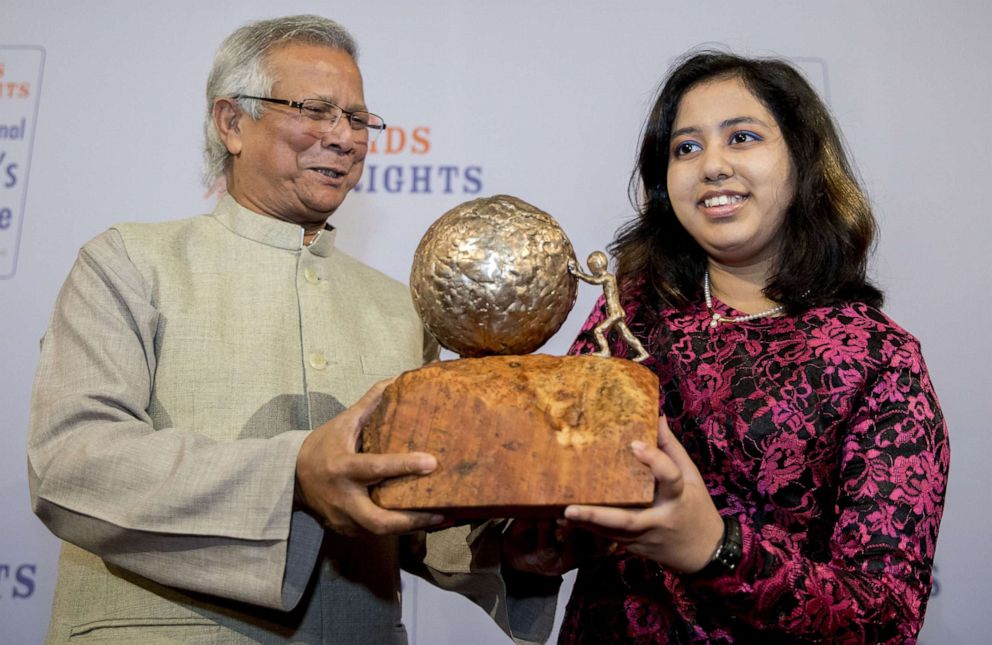
Kehkashan Basu has done more for the climate fight in her short life than many who are twice or three times her age.
The 20-year-old from Dubai is a United Nations Human Rights champion, has been featured in the Forbes' "30 Under 30" list and founded the Green Hope Foundation, a global social innovation youth enterprise that works with those who are in vulnerable and marginalized communities, in 2012 when she was just 12 years old.
The organization has a specific focus on women and children, groups that are often affected most by the pressing challenges of the world, which includes climate change, Basu told ABC News.
Basu was 7 years old when she saw an image of a bird that had died with a belly full of plastic. On her eighth birthday, which is also World Environment Day, she planted her first tree, and four years later she started her foundation to provide children and young people with a platform to learn about the challenges in sustainability and how to take actions to mitigate those problems in their own communities, she said.
Basu said the empathy that has run rampant in her household inspired her to provide knowledge to the less fortunate.
"I used to see my parents go out every weekend to distribute food and clothes to those in need," she said. "So I grew up with the notion that giving back to the society and our community and environment was something that was just normal and something everyone had the responsibility to do."
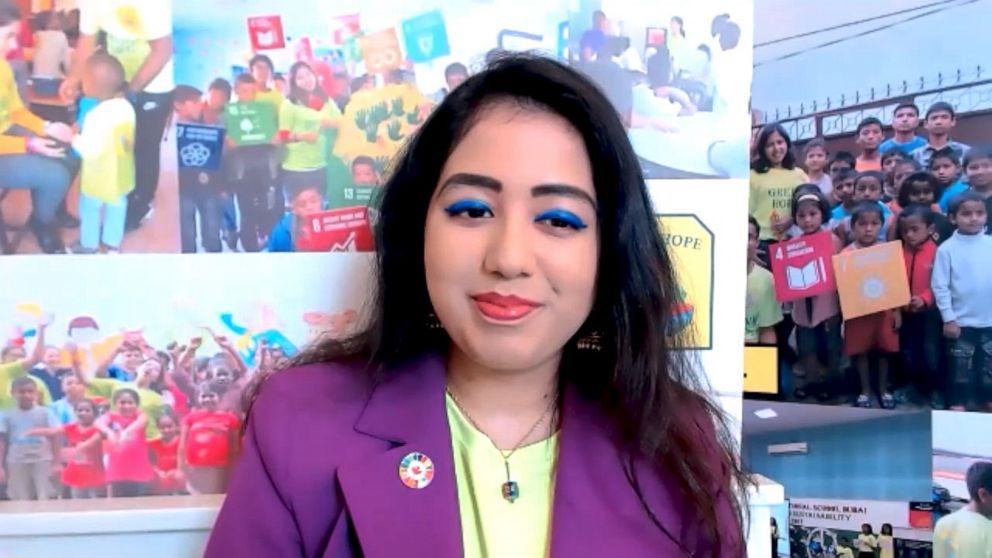
Once the U.N. caught wind of the work she was doing, Basu was invited to speak at her first conference in Bandung, Indonesia. One year later, in 2012, she spoke in front of 50,000 delegates at the U.N. Conference on Sustainable Development in Rio de Janeiro, Brazil.
But, Basu's youth has not always been a blessing in the climate fight. As a young girl, she faced cyberbullying, including threats of physical abuse, stalking, online harassment and slander, she said. The abuse did not just come from adults and established institutions, but also from older youth activists.
It was mostly men who engaged in the attacks, Basu said. But she decided that her passion for her work was greater than her "fear of these horrible people."
Basu believes it's important to have diversity and inclusivity in every field, but especially in the climate change arena, since it disproportionately affects vulnerable communities. "So if you leave out one half of humanity, or like, you know, a major demographic, you're not going to be able to solve the climate crisis or any of our world's issues, because you're actually leaving out those who are most affected by these problems," she said.
ABC News' Nam Cho and Jill Tatara contributed to this report.




